Filteredwaterguide.com is supported by readers. If you purchase through referral links on our site, we make a commission at no extra cost to you. Learn more.
Water Softeners have exploded in popularity in recent years as people become more aware of their benefits and while plenty of attention is paid to the best Water Softeners on the market, there is much less discussion around the Salt that is vital to make them work.
We have taken a deep dive into five of the top-selling salts available to answer the question: “Which Softener Salt is Best?”
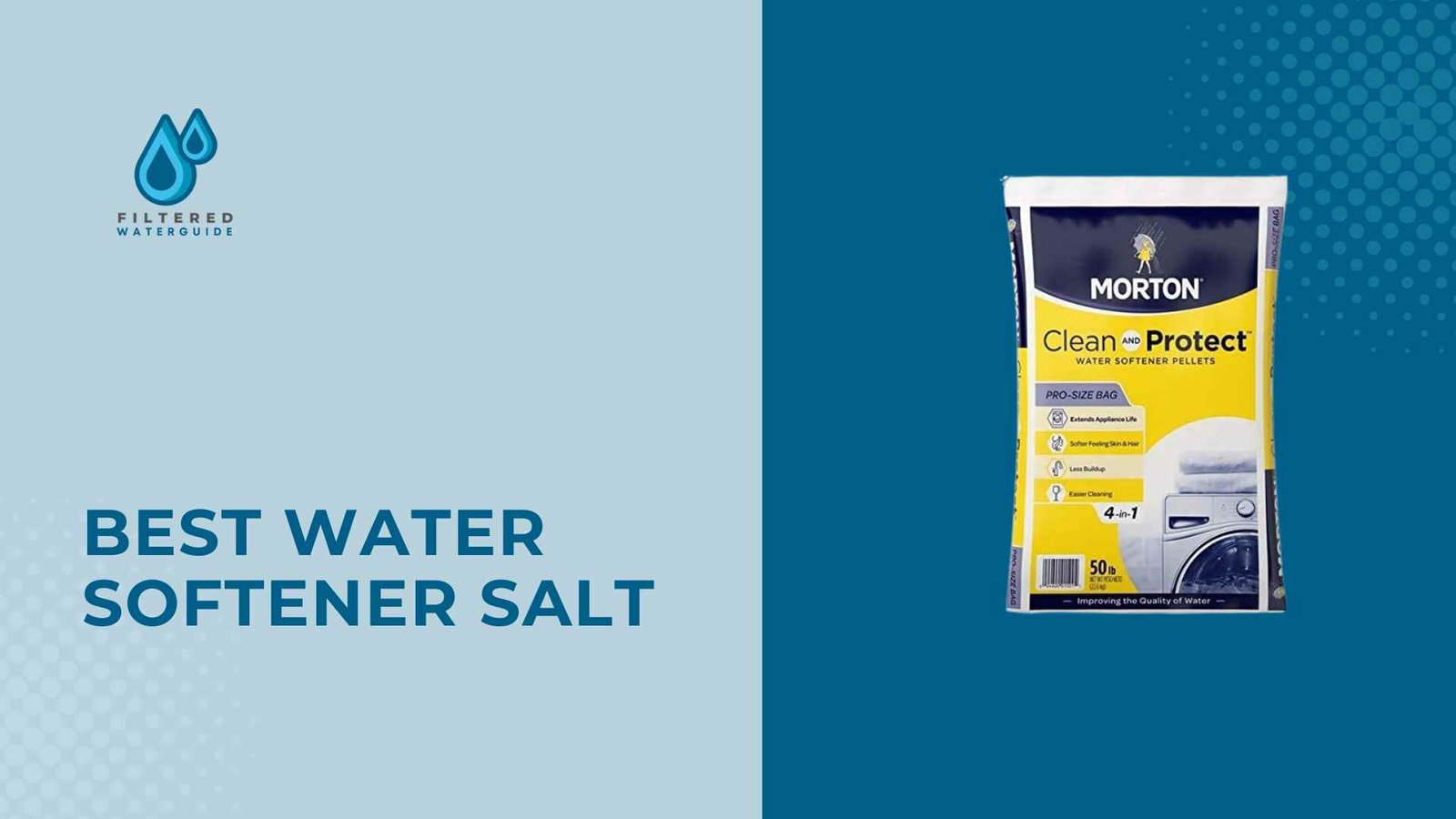
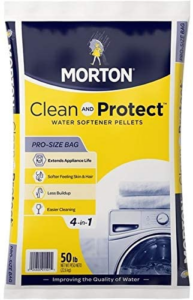
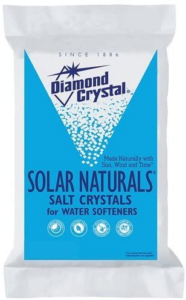
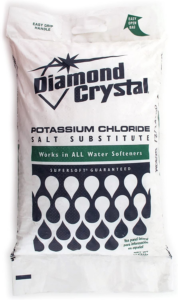

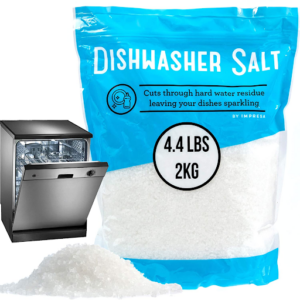
We’ve reviewed all of our top water softener salt picks in detail below so that you can make the best decision.

Morton Clean & Protect salt pellets can be used in any domestic water softener, and are manufactured by a company with a rich history in the water softener business.
The pellet manufacturing process makes it easier to bind additives evenly into the salt mixture and this has allowed Morton to produce a highly rated salt formula with Clean and Protect.
Along with the benefits you would expect from softened water, these Clean and Protect pellets contain a patented additive formula which treats pipework and appliances to prevent the mineral build up, which can be an issue for some other salt types, especially rock salt.
Although Clean and Protect salt pellets are sodium based, customers report no issues with a salty taste in the water, and reduced silkiness versus other brands.
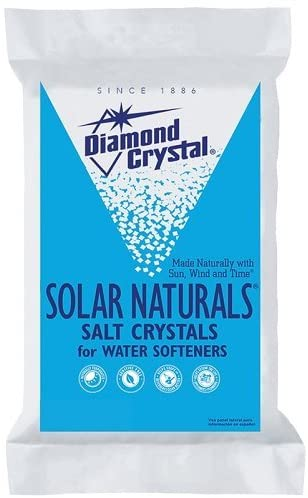
This softener salt from Solar Naturals is completely pure and free of any additives. Derived from evaporated salts from seawater, it is harvested and packaged in powdered crystal form without any undue processing.
This softener salt is so pure it can actually be used as table salt, and would even be effective at treating ice on your driveway!
These crystals are coarse due to the nature of their formation dusting the evaporation process and although this can mean that they do not dissolve as easily as finer grains, it is rare for this to cause issues within a domestic water softener
Great care has been put into the packaging of this product, with a plastic liner used within the polythene bag to prevent water ingress. This removes some of the risk associated with storing the procust in garages or basements which tend to be damper than the house itself.
The product also comes in polyethylene bags with polyethylene film liners for moisture protection.
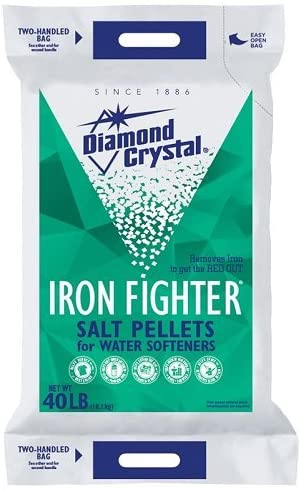
Diamond Crystal has looked to solve a very specific hard water problem with their Iron Fighter salt pellets – rust stains on appliances and sanitaryware.
Municipal water quality can vary and some areas tend to have higher levels of iron in the water supply which causes staining over time, not to mention borehole or well water supplies which can require specific filtration to treat.
The sodium chloride pellets contain an FDA-approved additive which actively neutralises the iron in the water, preventing it from causing stains in addition to softening hard water.
Diamond Crystal have even given thought to their packaging, providing two handles to make topping up the softener tank as easy as possible.
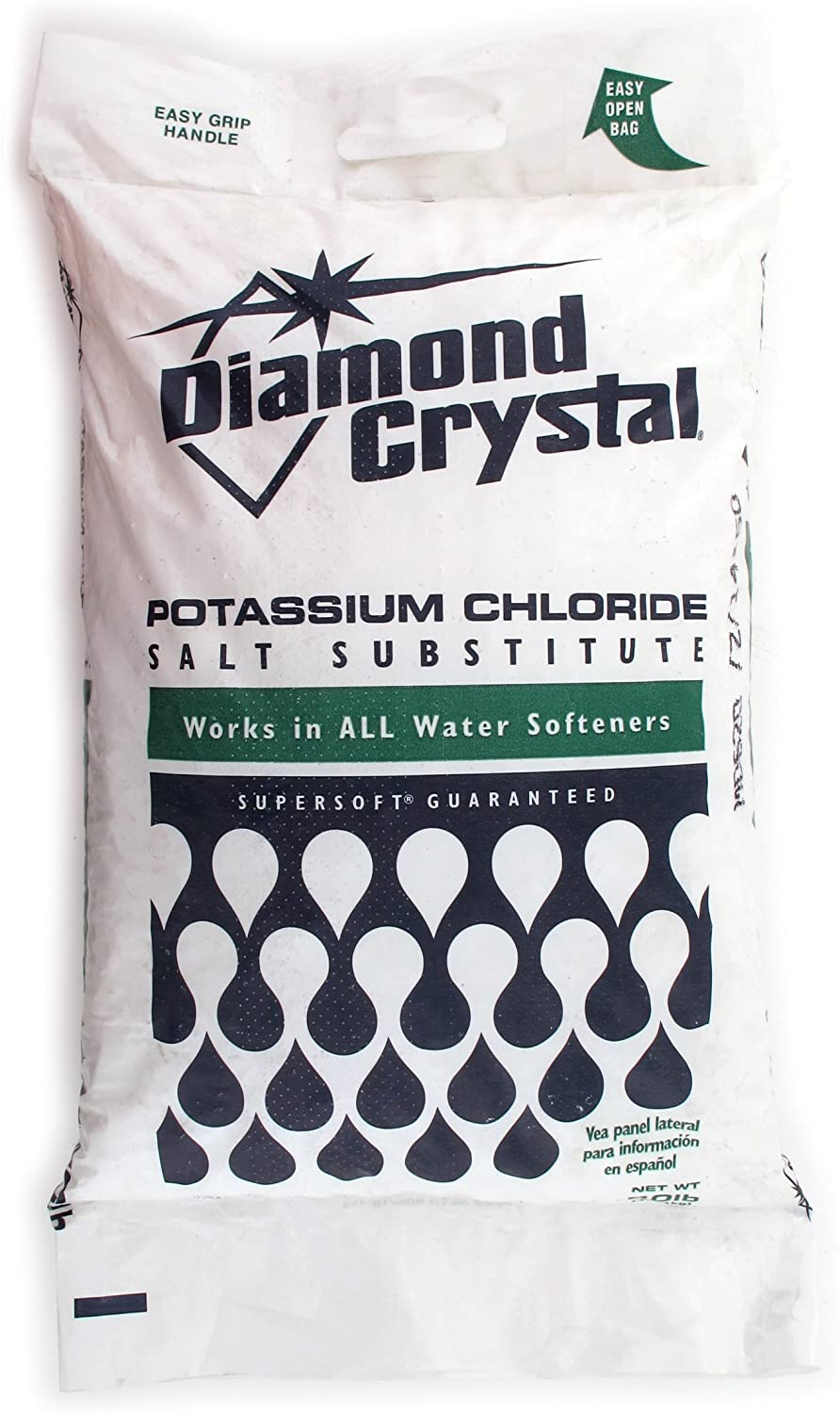
The potassium chloride pellets (KCl) are NSF certified, and a great alternative to sodium-based salts.
Unlike Sodium chloride crystals, these don’t carry the associated links to medical conditions and are more environmentally friendly, making them more suitable for garden use where a whole house water softener is used.
NSF certification is uncommon amongst softener salts and although not suitable for direct use in foods due to additives in the salt, these KCl pellets are certified safe for consumption. These additives help to protect your plumbing systems and minimise scale build ups in appliances and sanitaryware.
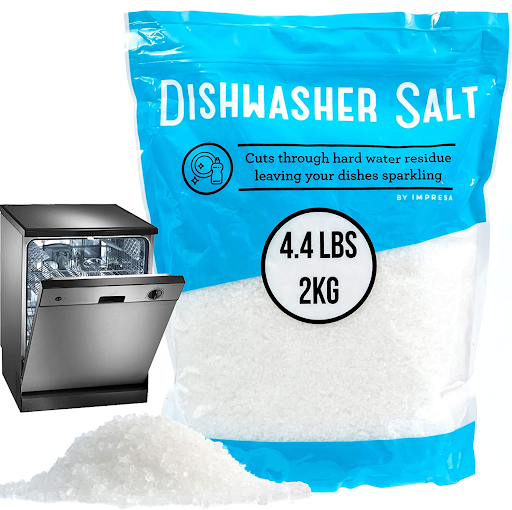
This dishwasher salt by Impresa perfectly demonstrates the similarity between domestic salt products.
It is suitable for use in both dishwashers and water softeners and is available in a smaller package than most softener salts which makes it ideal for small households, or an emergency back-upin case your regular salt supply runs low.
The small package sizes also means that this Impresa salt is the cheapest priced water softener salt in our review, although it should be noted that its cost per weight is higher than others here.
Due to its versatility, it is no surprise that the grains of this salt are more coarse than other powdered salts we have reviewed, although this doesn’t influence its performance.
If you are looking for a versatile salt for a low-use environment (such as a cabin or summer home), this is a great salt to choose.
The most commonly available, Rock Salt is mined underground and is the least processed salt available for water softeners.
Rock salt often contains impurities, as it was found in the ground and this means that water softeners using Rock Salt will usually require more cleaning as these impurities are often left behind in the brine tank during the softening process.
Solar Salt is collected as a result of the process of evaporating sea water. Crystals form as the water is removed, and these are then collected and packaged.
Solar Salt is very pure and hence is preferred in many industrial processes (not just water softening), as the salt crystals do not contain impurities which are often associated with a greater maintenance burden on machinery.
Solar Salt is a more expensive option for use in water softeners than Rock Salt.
Evaporated Salt is the purest available, and comprises pure salt with no impurities. This is the result of a careful, scientific process where the raw salt crystals are reduced to chemically pure, 100% sodium chloride.
Evaporated Salt is usually sold as salt pellets and is also popular for more uses.
Potassium chloride is sold as an alternative to traditional sodium chloride based softener salt.
Sodium chloride is the chemical particle that makes up normal table salt. Thanks to links found by researchers between dietary salt consumption and some medical conditions, some people prefer to minimize the amount of sodium chloride in their diet.
As drinking water is likely to be softened when using a whole house water softener, this can affect the drinking water supply.
Potassium chloride is a type of salt for water softeners which is able to perform the same chemical process in water softening, without using sodium chloride. This makes it an ideal alternative to traditional salts.
The chemical composition of different water softening salts is the choice between sodium chloride and potassium chloride.
Both types of salt give the same outcome from the water softening process however the use of potassium chloride allows softeners to treat hard water without adding sodium to the water, which has been linked to some medical conditions.
While both salt pellets and crystals can be used in water softeners to treat hard water, crystals tend to dissolve more easily and dissolve faster in the brine tank. This tends to mean that there are fewer issues with blockages in the tank.
As they require less processing than salt pellets, crystals are often a cheaper alternative.
Salt pellets often contain additives which are incorporated to protect plumbing systems and treat other impurities in the water supply.
This is a self-explanatory, but often overlooked factor in choosing softener salt.
The decision on how much to append salt is a balance between the immediate purchase cost of the salt and the cost of water softener repair later. Cheap salt is often consumed by the softener faster than a high-quality salt, increasing the amount required over time.
Should you choose to spend money on the best water softener salt your softener is likely to stay cleaner and cause fewer problems in the long run.
As with all water products, the best option is the one which works for you. It is the same when you are searching for the best water softener salt.
Depending on your personal health and preference, you may prefer to use potassium chloride salt pellets instead of sodium to increase your potassium intake. This can assist in lower blood pressure and reduce symptoms of stress and anxiety.
More and more people are factoring the environmental impact of the choices when making buying decisions and softener salt is no different.
During the regeneration cycle, sodium chloride softener salts cause a sodium rich solution to be flushed to drain which can have an ecological impact, rendering soil infertile and killing plant life.
Potassium chloride avoids this downside, with no environmental impact from the regeneration cycle.
This is closely tied in to running cost – the flow rate of the softener, the feel of the water (or the ability to adjust the water softness) and the lifespan of the vital components will all be affected by the salt used in the softener.
If the very cheapest salt is used, it is likely that in time faults will occur.
The amount you need will entirely depend on your household and the hardness of the water at your property.
Larger households that use more water will need more salt to treat hard water than a household with fewer people that use less water.
Similarly, if the water in an area is very hard a water softener will use more salt in the process of softening.
On average, a household of 4 people using hard water of 7-10 grains per gallon will use 9-10 lbs of water softener salt each month.
Increased iron levels in the water, higher usage or reduced flow from the water supply are all factors that could increase the salt consumption of a water softener.
This is a very simple process, and is explained in all manufacturer’s product literature, but there are a few steps you can take to make topping up your brine tank as trouble-free as possible.
Firstly, before lifting the lid on the brine tank, check for any leaks around the softener connections.
This is a very quick maintenance check that will leave you with peace of mind that there are no serious problems quietly brewing.
You should also make sure that there is no dirt or dust around the neck of the lid, which may fall into the brine tank when you open it. If there is any debris around the lid, wipe this away with a damp cloth before opening.
Once you have opened the brine tank, inspect the bottom for any signs of salt bridges, patches of discoloration or sediments which might indicate that your softener is not working at its best. If you find anything unusual, do not fill the tank until you have addressed it, or are satisfied that it is not going to cause a problem.
To fill, note the maximum fill level and cut the corner off your salt bag. Pour the salt carefully into the brine tank, making sure that you do not overfill.
Once filled, wipe away any salt that has spilled and ensure the lid is closed properly.
Both Diamond Crystal and Morton are brands with a strong background in water softeners.
As is often the case, there is no right answer to “Which is best?”… it will depend on your home.
Diamond Crystal makes a wide range of water softener salt, and is able to offer suitable solutions to all types of softener and water supply.
Morton’s background in the water softener industry means that their salt products are designed with softener life and longevity in mind, often using additives which improve the performance and lifespan of the water softener.
We can only advise that you check out the products and pick the one which best suits your circumstances.
You can, yes however it is not recommended and may void the manufacturer’s warranty on your machine.
Purpose made salt for water softeners has been processed to remove all impurities and has a chemical composition engineered to provide the best results when used in a softener.
Although standard table salt is very similar, it still contains many elements which will build up over time inside your softener. While these are not directly harmful to human health, a water softener is not designed to cope with these small particles and they will clump inside the softener, eventually causing failure.
There is no benefit to using food-grade salt in a softener (pound-for-pound it costs almost the same!) and it is not recommended. Softener grade salt is available from most hardware stores, and is readily available online for next day delivery.
Mixing different types or brands of softener salt shouldn’t cause your softener any harm, because they are all designed for the same purpose.
Mixing salts may affect the quality of water softening from the system. For example, if potassium chloride is used in the softener and mixed with sodium chloride softener salt the benefits will be eliminated. Even though hard water will still be tackled, the sodium based salt is being added to the water so you won’t see the best results.
If you don’t add softener salt to your machine, hard water will run through the system without being treated. This means that you will not receive the benefits of the water softener and your plumbing will not be protected from hard water and the issues it can cause.
Although water softeners are not designed to be used without salt, for very short periods there shouldn’t be any ill effect on your machine.
You will notice the difference is the feel and the taste of the water (especially in areas with very hard water), although it may take weeks for scale build up on fixtures and appliances to become noticeable.
Should your softener need salt, it should be filled as soon as possible to maintain operation.
If you refill the tank from empty, it is wise to run water through all of the outlets in your home to purge the hard water from the system and restore soft water.
You’re using rock salt
Rock salt is naturally formulated and contains particles that will not dissolve in water. This means that you may notice sand or sediments in the water, as these minerals are carried through the system.
Answer: Use an alternative water softener salt.
Water softener parts are leaking
Damage to your water softener can cause dirt and sediments to leak into the softened water supply, and become noticeable at the taps.
You can test this by running hard water through your softener’s bypass and seeing if the water runs clear after flushing the soft water through.
If you suspect damage to your water softener, we recommend calling in a professional to assess the machine and provide advice on how best to proceed with repair or replacement.
Answer: Check for leaks and have softener repaired.
Wrong refilling methods
Ensure that you take care when refilling the salt tank to make sure that nothing else can enter the reservoir.
If your softener is installed in a basement or garage, you may need to clean the top of the unt before opening the lid to make sure that dirt and dust are not able to enter the system.
Similarly, if your salt bags are dirty or have been left outside you should wipe away any dirt and debris before lifting them over the tank to refill.
Answer: Ensure no debris is entering the softener when you refill.
The rotten egg smell that is so recognizable is a result of sulfur (or sulphites) in the water.
This is usually the result of elements or chemicals within the incoming water supply, and is not a problem which your water softener is able to solve.
To effectively treat sulphur within the water supply a filtration system is needed (these systems can be installed alongside water softeners).
We would strongly recommend having your water supply tested if you suspect the presence of chemical contamination, to ensure that it is safe to drink.
Salt bridges can be a nuisance and cause your water softener to operate less effectively and cost more to run however thankfully there is a straightforward solution.
Using a broom handle (or a long tool that allows you to reach the bottom of the tank), knock the bridges down, making sure that you have removed them all.
Unfortunately salt bridges are a common occurrence in water softener systems and if you find them, there is a strong chance they will form again, even after you have removed them.
The different chemical compositions of different salt brands may contribute to the frequency of salt bridges forming, so it may be worth switching your softener salt to an alternative brand to see if this helps to reduce the build up of salt bridges.
If you were to drink well water and softened water alongside one another you would certainly notice a difference, but people who drink softened water in their homes report getting used to the slightly different taste very quickly.
After a week of drinking softened water, most people don’t notice the difference.
We can’t fault any of the products in our review, and this makes it very difficult to pick an outright winner but we think that one of the best options is the Morton Clean and Protect.
Also, make sure that you have one of the best residential water softeners to use your salt with.
If you have a great salt-based softener and the best water softener salt you should get clean, pure, soft water for your home!
© 2024 Filtered Water Guide. All rights reserved.